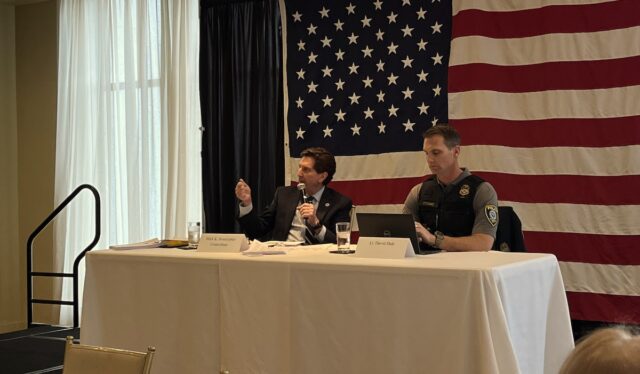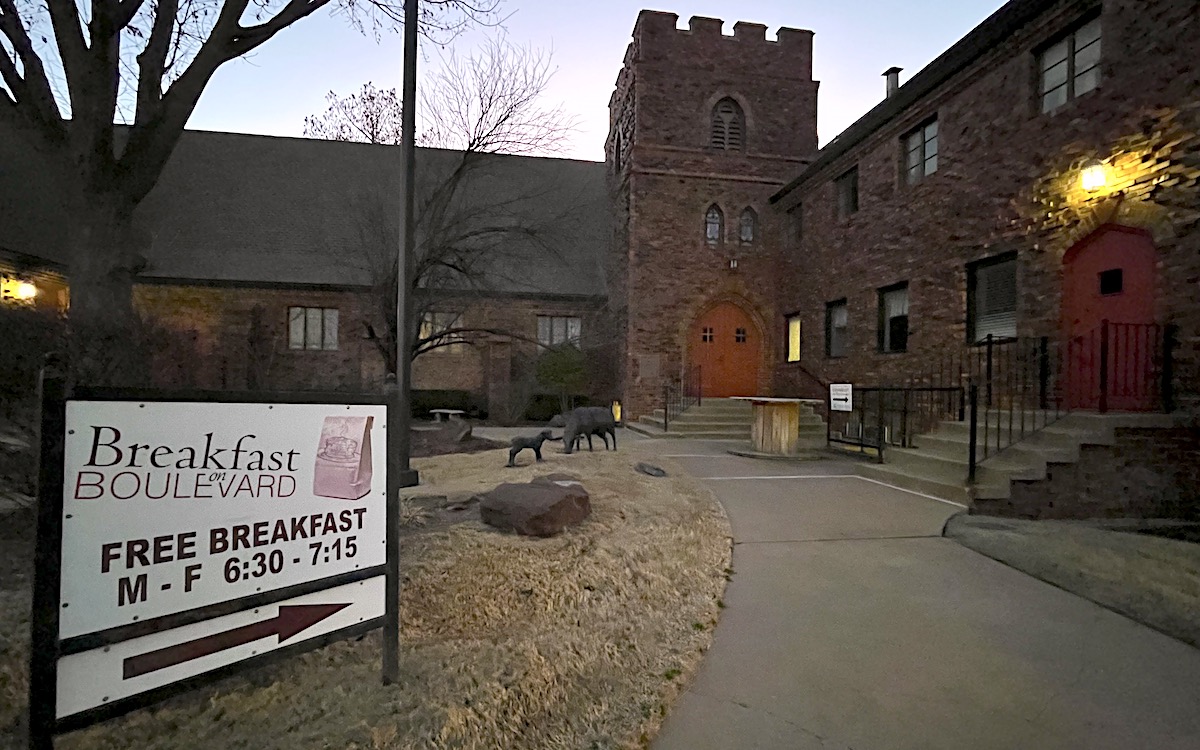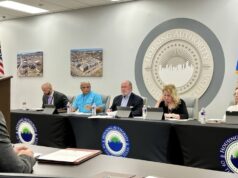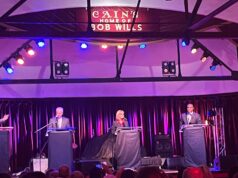

At a Nichols Hills country club this morning, OKC Ward 8 Councilman Mark Stonecipher led a discussion on homelessness in Oklahoma City, referencing his own previously proposed ordinances that would have allowed police to cite and arrest homeless people on public or private property.
Stonecipher noted the controversy surrounding those ordinances, which were struck after four hours of public comment at a November OKC council meeting.
“Some said that I just wanted to criminalize homelessness. That’s the furthest from the truth,” Stonecipher said. “I want to help people that have problems. I want to help people that have mental health problems, and I want to get them to the services as fast as we can to help them.”
One ordinance Stonecipher proposed would have required homeless people on private property to provide documentation to police that shows they are allowed to be on the property.
“If you are a trespasser,” Stonecipher said, “and it’s hostile conditions like that, the police will come up and they can say, ‘You need to give us some verification that says you’re allowed to be here — your lease, your license, something that shows you’re entitled to be on that property. If not, we can move you.'”
The other ordinance Stonecipher proposed related to homeless people who are routinely encountered in public spaces. On first encounter, Stonecipher said, police would issue a warning and provide a list of available resources. But if that person did not leave the area after being encountered on multiple occasions, police could issue a ticket or even put them in jail.
“When I presented this to the City Council at City Hall, there were numerous people that spoke out against me and said it was wrong to criminalize the homeless people,” Stonecipher said.
Stonecipher claimed that a “large portion” of people who spoke against his ordinances were from outside Oklahoma City, a statement that exacerbated the irony of Tuesday’s discussion being held outside Oklahoma City boundaries in Nichols Hills.
“I was kind of taken aback by that, especially since a large portion of them — in my mind, when they introduced themselves — weren’t even from Oklahoma City,” Stonecipher said. “We had people from as far away as Norman trying to tell us what to do with our homeless population.”
Lt. David Dale, Oklahoma City Police Department’s homeless outreach team supervisor, led the forum alongside Stonecipher. Dale told attendees that it is legal for homeless people to solicit on the side of the road and in roadway medians.
“That’s all a misconception with the public,” Dale said. “So we get those calls about panhandlers in the median, and again, we can’t force them to leave.”
‘I believe strongly we can end homelessness in our lifetime’
OKC Ward 2 Councilman James Cooper attended Tuesday’s forum — hosted by the Oklahoma City Republican Women’s Club — sitting among about 60 people who gathered at the Oklahoma City Golf & Country Club for the event. A vocal affordable housing advocate, Cooper stood and spoke briefly near the end of the discussion after Stonecipher noted his presence earlier in the forum.
“I believe strongly we can work together to end this, and here’s how we do it,” Cooper said referencing the discussion. “There are solutions and we’re really close. But it’s going to take your advocacy.”
After the forum, Cooper said there are two components to addressing the issue: street outreach teams and housing. Both fall under the “housing-first umbrella,” he added.
Oklahoma City recently hired its first street outreach teams. In December 2019, OKC Mayor David Holt and city leaders successfully advocated for the passage of the MAPS 4 sales tax extension, which included $55.7 million for the city to implement a “housing-first” strategy.
“MAPS 4, while I think that’s great with housing, that housing is not going to come online until later,” Cooper said. “I’d like to see the city this year and next year commit to rapid rehousing — building housing on city-owned land — and I’d like to see them do everything they can to incentivize case managers to come here.”
Cooper criticized Stonecipher’s event rehashing his previously failed ordinances.
“That is frustrating. It’s nonsensical. It’s ridiculous. It’s a waste of everyone’s time,” Cooper said.
‘How many of our homeless came from the border?’
After Stonecipher and Dale’s opening comments, microphones were passed to attendees who had general questions on services and solutions.
In response to a question on why homeless people sometimes refuse services, one woman said, “You can’t just convince somebody to go and leave where they feel safe.”
“We have a lot of people who have a lot of empty buildings. We have a lot of nonprofit organizations,” she added. “I think that we oughta have some kind of tax credit for the people who own the building and for other nonprofits to kind of take that over and let us do what we need to do to take care of people.”
Another attendee asked how many people experiencing homelessness in Oklahoma City may be undocumented immigrants or may have been bussed in from other states. The question provoked applause from one section of the room and snide laughter from another.
In response, Dan Straughan, executive director of the Homeless Alliance in OKC, said that during the city’s annual point-in-time count — a snapshot census of homelessness in the community — unhoused people are asked what ZIP code they lived in prior to losing housing.
RELATED
‘You are not welcome’: Without shelter, resources limited for Edmond’s unhoused by Joe Tomlinson
Straughan said 75 percent of the homeless surveyed during OKC’s annual count name Oklahoma City ZIP codes, 20 percent give ZIP codes from other areas across the state, and 5 percent give ZIP codes from outside of the state.
“Almost all of those, when you drill down a little deeper, they came here for the reason everybody comes here — a family or a job, and that didn’t pan out,” Straughan said. “So this trope that people are being bussed in from other states — it’s not happening and never has happened.”
Stonecipher said his ordinances were modeled after similar ordinances in Houston and San Diego, but Straughan said after the meeting that Houston put significant funding towards services, which “made the difference.”
“Simultaneous to the ordinance, the city of Houston put up $50 million, Harris County and the other counties that Houston sprawls into matched that with $50 million, and then HUD matched that total with $100 million. So in addition to the ordinance, they had $200 million for street outreach, for housing, for mental health services, for substance-use treatment services,” Straughan said. “That’s what made the difference — not that ordinance, that investment.”
Straughan said that he disagrees with Stonecipher’s proposed ordinances. But he said he found the event to be engaging.
“Everybody wants to solve the problem and has different ideas about how to go about that. The only way we’re going to hammer that out is if we sit down and talk,” Straughan said. “The ordinance is not something that I think is going to make a difference, and that’s just something we’re going to disagree on, but we have the same ultimate goal in mind.”
In February, the city celebrated a partnership with the Mental Health Association of Oklahoma to reopen an apartment complex aimed at providing affordable housing.
(Clarification: This article was updated at 6:25 p.m. Tuesday, March 21, to clarify the host of the forum.)





















